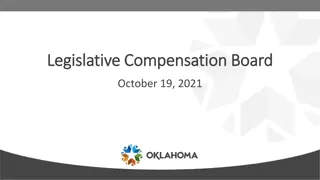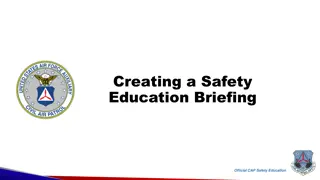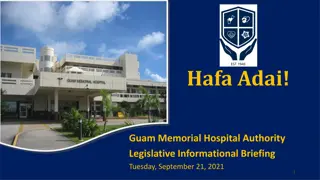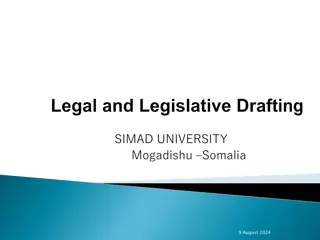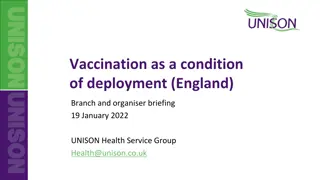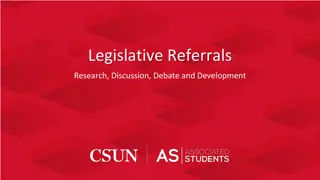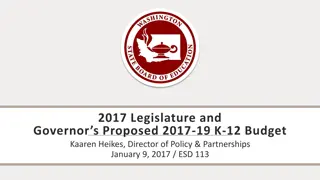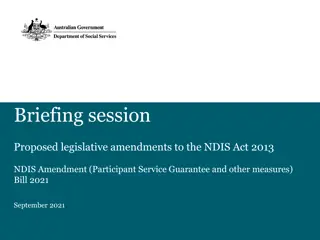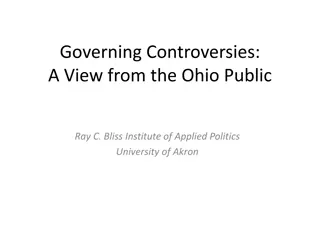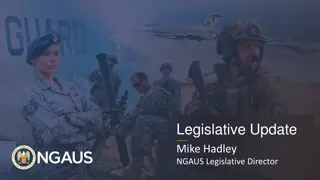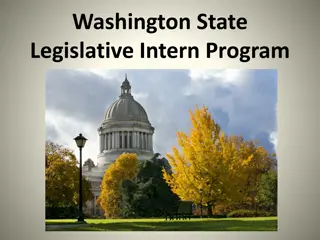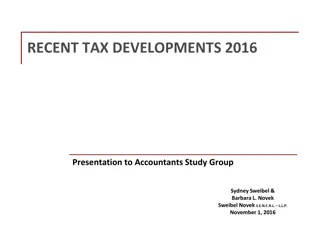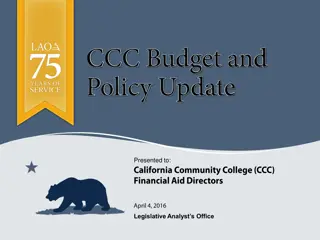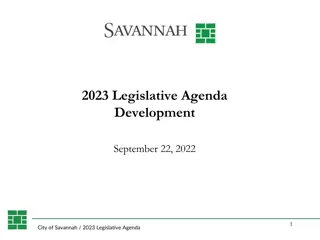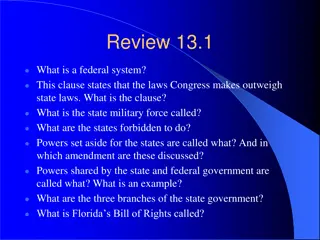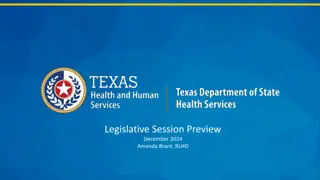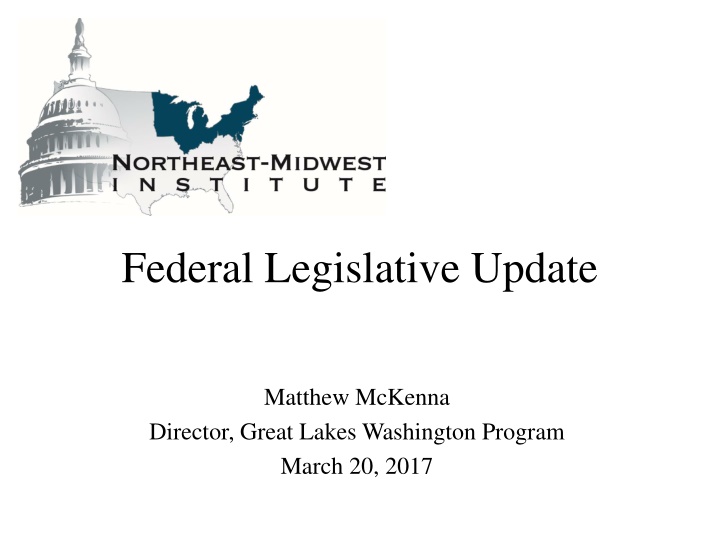
Legislative Update: Congress Actions on Federal Budget and Great Lakes Funding
Stay informed about the latest federal legislative actions regarding the FY18 budget, appropriations bills, and the fight to fund the Great Lakes Restoration Initiative (GLRI). Congress faces challenges in passing key bills, making critical funding decisions, and addressing environmental concerns affecting the Great Lakes region.
Download Presentation

Please find below an Image/Link to download the presentation.
The content on the website is provided AS IS for your information and personal use only. It may not be sold, licensed, or shared on other websites without obtaining consent from the author. If you encounter any issues during the download, it is possible that the publisher has removed the file from their server.
You are allowed to download the files provided on this website for personal or commercial use, subject to the condition that they are used lawfully. All files are the property of their respective owners.
The content on the website is provided AS IS for your information and personal use only. It may not be sold, licensed, or shared on other websites without obtaining consent from the author.
E N D
Presentation Transcript
Federal Legislative Update Matthew McKenna Director, Great Lakes Washington Program March 20, 2017
2017 Legislative Outlook The Administration s FY18 Budget Blueprint Congress and the FY17 and FY18 Appropriations Bills The Fight to Fund GLRI The Vessel Incidental Discharge Act (VIDA) Great Lakes Specific Legislation Congressional Great Lakes Task Force Activities Other Major Federal Legislative Initiatives
The Administrations FY18 Budget Blueprint Eliminates all funding for the GLRI. Reduces the EPA s budget by 31 percent and cuts its workforce 20 percent which would eliminate roughly 3,200 jobs at EPA. The Blueprint also reduces support for EPA programs looking to combat climate change and reduces grants to states and local governments by $482 million. Reduces the Department of Commerce s budget by 16 percent and calls for the elimination of $250 million in NOAA grants and programs including the Sea Grant program. Reduces the USDA s budget by 21 percent including decreasing funding for lower priority programs in the National Forest System and eliminating programs like the USDA s Rural Development Water and Wastewater Loan Program. Reduces the Department of Transportation s budget by 13 percent by eliminating programs such as the TIGER discretionary grant program.
Congress and the FY17 and FY18 Appropriations Process Congress has until April 28 to pass the remaining 11 appropriations bills keeping the government funded through September 30th. The House passed the FY 2017 Defense Appropriations Act earlier this month that was pre-negotiated with the Senate. This could serve as a potential vehicle to move an omnibus bill. President Trump is looking for an additional $18 billion in cuts in FY17, but Congressional appropriators could ignore this. Congress could also consider a supplemental bill for FY17 that would provide an additional $33 billion in spending for defense and for the construction of a wall on the southern border, House Appropriations Committee Chairman Rodney Frelinghuysen (NJ) and Senate Appropriations Committee Chairman Thad Cochran (MS) are beginning hearings on the FY 2018 budget this week.
Fight to Fund the GLRI At the end of 2016 Congress passed a $300 million a year, five year authorization of the GLRI in the WIIN Act / WRDA 2016. Earlier in the fall, Rep. David Joyce (OH) had offered his GLRI bill as an amendment to the House s original version of WRDA. It passed by a vote of 407-18. It should be noted that one of the No votes was former- Congressman and current OMB Director Mick Mulvaney. The Senate Great Lakes Task Force, led by Co-Chairs Senators Debbie Stabenow (MI) and Rob Portman (OH), sent a bipartisan letter to EPA Administrator Pruitt expressing their deep concerns with drastic cuts to the GLRI (3/10). Additional Senators signing onto the letter included: Senators Klobuchar (MN), Durbin (IL), Brown (OH), Baldwin (WI), Franken (MN), Donnelly (IN), Gillibrand (NY), Casey (PA), Peters (MI), and Duckworth (IL). Additionally, letters calling on Congressional Appropriators to fund GLRI at $300 million in FY18 are also being worked on.
The Vessel Incidental Discharge Act (VIDA) VIDA Reintroduced in 115th Congress o VIDA requires the U.S. Coast Guard to develop national ballast water standards and removes the Clean Water Act s jurisdiction over ballast water management systems. o Senator Roger Wicker introduced S. 168 on 1/17/17 and Congressman Duncan Hunter Jr. introduced H.R. 1154 on 2/16/17. Senate Commerce Committee Approves VIDA o On 1/24/17, the Senate Committee on Commerce, Science, and Transportation approved VIDA by voice vote without amendments. o While the bill was reported favorably by the Committee by voice vote, a handful of Democrats on the Committee asked to be recorded in opposition to the legislation including Great Lakes Senators Tammy Baldwin (WI) and Gary Peters (MI) citing concerns with invasive species.
Great Lakes Specific Federal Legislation Introduced in the 115th Congress Preserve Our Lakes and Keep Our Environment Safe Act (H.R. 458) o Introduced by Reps. Dave Trott (MI) and Debbie Dingell (MI) on 1/11/17. o Directs federal regulators to decommission the controversial Enbridge pipeline under the Straits of Mackinac if a 12-month Department of Transportation study finds it poses a significant risk to the Great Lakes. Ban Aquaculture in the Great Lakes Act (H.R. 961) o Introduced by Rep. Dan Kildee (MI) on 2/7/17. o Bans aquaculture facilities in the Great Lakes. Congressional Resolution Calling on the Canadian Government to not permanently store nuclear waste in the Great Lakes Basin (H. Res. 197 and S. Res. 88) o Introduced by Sens. Debbie Stabenow and Gary Peters and Rep. Dan Kildee last week. o Expresses Congressional opposition to construction of a nuclear waste repository less than a mile from Lake Huron in Ontario.
Great Lakes Specific Federal Legislation (continued) The Great Lakes Fishery Research Authorization Act of 2017 o Introduced by Reps. Mike Quigley (IL) and Fred Upton (MI) on 3/16/17. o Formally authorizes the US Geological Survey (USGS) Great Lakes Science Center (GLSC) to ensure critical scientific support for the commercial Great Lakes fishery industry.
Congressional Great Lakes Task Force Congressional Great Lakes Task Force Leadership (italicized indicates new to the leadership this Congress): Senate Co-Chairs Senators Debbie Stabenow (MI) and Rob Portman (OH) Senate Vice-Chair Senators Amy Klobuchar (MN) House Co-Chairs Representatives Louise Slaughter (NY), Sean Duffy (WI), Marcy Kaptur (OH), and Bill Huizenga (MI) Recent Activities by Great Lakes Task Force and Great Lakes Congressional Delegation 2/8 Bipartisan House letter to President Trump urging him to fund the GLRI, respond to the threats that invasive species pose to the Great Lakes, and fund key infrastructure initiatives like the modernization of the Soo Locks. 2/22 Bicameral and bipartisan letter to the U.S. Army Corps of Engineers stressing the importance of completing the study at the Soo Locks in an accurate and timely manner. 3/3 Bipartisan House letter to President Trump calling on him to urge the U.S. Army Corps of Engineers to immediately release the first draft of the Brandon Road study. 3/10 Bipartisan Senate letter to EPA Administrator Pruitt about concerns of dramatic cuts to the GLRI.
Other Big Ticket Legislative Proposals Major infrastructure legislation o During the 2016 Presidential election, President Trump pledged new major investments in infrastructure. o The White House has yet to release any significant details about an infrastructure proposal. o Senate Democrats unveiled a $1 trillion plan to revamp the nation s airports, bridges, roads and seaports. 2018 Farm Bill o The House and Senate Agriculture Committees have already began holding legislative hearings on an upcoming farm bill. o The conservation title of the bill will likely look to build upon the NRCS s Regional Conservation Partnership Program (RCPP), the voluntary program between conservation partners and agricultural producers to work together to harness innovation and expand the conservation. Trade Agreements o The renegotiation of NAFTA: Revisit electric commerce; Labor standards; and Environmental standards. Water Resources Development Act (WRDA) o Leadership in Congress has said that it s their goal to pass a WRDA every two years. o Major U.S. Army Corps projects like the modernization of the Soo Locks could be a target for a WRDA bill in 2018. Energy Reform Package o Last year, House and Senate negotiators came close to striking a deal on energy efficiency reforms. These efforts could resume this Congress. Tax Reform
Questions NASA


